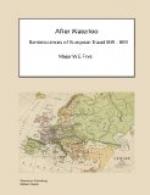re-entered the army as “marechal de camp,” and, on the 2nd November of
that same year, was promoted general commander of the department of
Puy de Dome. He retired on the 8th March, 1817, and seems to have been
much regretted at Clermont. Died 1821.—ED.
[105] Jean Francois Wlnkens, born at Aix-la-Chapelle
In 1790, is mentioned
in the records of the French
War Office as having served in the 25th
Regiment at Waterloo.
His family may have belonged to Strassburg.—ED.
[106] Pierre Jacques Jomini, Protestant minister at
Avenches from 1808 to
1819.—ED.
[107] The Treytorrens family, of old nobility and
fame, now extinct,
possessed a large estate at
Guevaux, on the borders of the lake of
Morat.—ED.
CHAPTER XIV
SEPTEMBER 1817-APRIL 1818
Journey from Lausanne to Milan, Florence, Rome and Naples—Residence at Naples—The theatre of San Carlo—Rossini’s operas—Gaming in Naples—The Lazzaroni—Public writers—Carbonarism—Return to Rome—Christmas eve at Santa Maria Maggiore—Mme Dionigi—Theatricals—Society in Rome—The papal government—Lucien Bonaparte, prince of Canino—Louis Napoleon, ex-King of Holland—Pope Pius VII—Thorwaldsen—Granet—The Holy Week in Rome—The Duchess of Devonshire—From Rome to Florence by the Perugia road.
I started from Lausanne with a party of two ladies in a Milanese vettura on the morning of the 20th September. We arrived at Milan on the 25th late in the evening. On passing the Simplon we met with three or four men who had the appearance of soldiers, and asked for alms something in the style of the old Spanish soldier who accosted Gil Blas on his first journey. Our ladies were a little alarmed. On travelling over the plains of Lombardy, one of these ladies, who had never before been out of her country (Switzerland) and was consequently accustomed to see the horizon bounded at a very short distance by immense mountains on all sides, was much alarmed, on arrival at the plain, at seeing no bounds to the horizon; she was apprehensive of falling down and rolling over. Her remark reminded me of one of the objections made to the project of Columbus’s voyage in discovery of a western passage to India; it was said that in consequence of the rotundity of the earth they would roll down and never be able to get up again. The sensation experienced by my fellow traveller, however, may be well accounted for and explained by any one who from a plain surface situated on a great height looks down without a railing or balcony.




